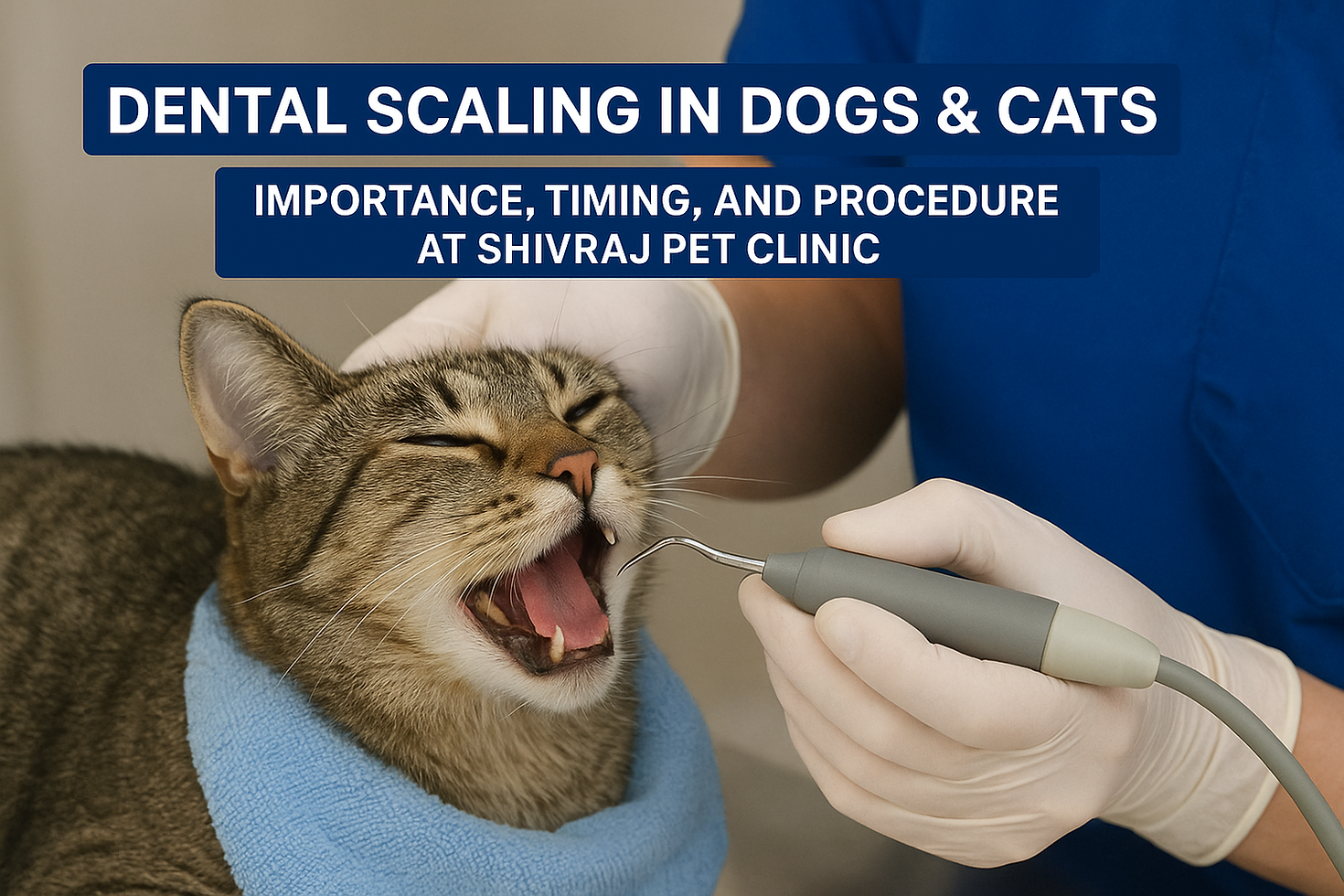
Dental Scaling in Dogs & Cats: Importance, Timing, and Procedure at Shivraj Pet Clinic
- shivrajclinic
- Aug 18, 2025
- 3 min read
When it comes to pet care, most owners focus on diet, exercise, and vaccinations—but one crucial aspect often gets overlooked: oral health. Just like humans, dogs and cats need regular dental care to stay healthy and comfortable. At Shivraj Pet Clinic, dental scaling is one of the most recommended procedures to maintain a clean, disease-free mouth for your pets.
Let’s explore why dental scaling is so important, when it should be done, and how the process is carried out at Shivraj Pet Clinic.
---
Why Oral Health Matters for Pets
The Link Between Dental and Overall Health
Poor oral hygiene in pets doesn’t just affect their teeth—it can lead to serious health problems. Bacteria from untreated dental infections may spread through the bloodstream, impacting the heart, liver, and kidneys.
Common Dental Problems in Dogs & Cats
Plaque and tartar buildup
Gum inflammation (gingivitis)
Tooth decay or loss
Bad breath (halitosis)
Painful oral infections
---
What Is Dental Scaling?
Definition and Purpose
Dental scaling is a professional cleaning procedure performed by veterinarians to remove plaque and tartar from a pet’s teeth—especially below the gumline where brushing cannot reach.
Tools and Techniques Used
At Shivraj Pet Clinic, vets use ultrasonic scalers and specialized hand tools to safely clean teeth without damaging enamel.
---
Importance of Dental Scaling in Dogs & Cats
Prevents Gum Disease and Tooth Loss
Without scaling, tartar builds up and leads to periodontal disease, which is the leading cause of tooth loss in pets.
Reduces Bad Breath and Pain
A cleaner mouth means fresher breath and less discomfort while eating.
Helps Detect Hidden Oral Issues Early
Scaling sessions allow veterinarians to spot early signs of tumors, infections, or broken teeth.
---
When Is Dental Scaling Recommended?
Age-Based Guidelines for Dogs and Cats
Small dog breeds: Every 6–12 months (they’re more prone to dental disease)
Large dog breeds: Every 1–2 years
Cats: Annual scaling recommended, especially for seniors
Visible Signs That Scaling Is Needed
Persistent bad breath
Yellow or brown tartar on teeth
Red or bleeding gums
Difficulty chewing or dropping food
Veterinary Recommendations at Shivraj Pet Clinic
The vets at Shivraj Pet Clinic recommend annual dental checkups, with scaling scheduled whenever tartar buildup or gum disease is observed.
---
How Dental Scaling Is Done at Shivraj Pet Clinic
Pre-scaling Examination and Blood Work
Before scaling, a complete physical exam and blood test are done to ensure the pet is healthy enough for anesthesia.
Use of Anesthesia for Pet Safety
Unlike humans, pets won’t sit still for a dental cleaning. Anesthesia is used for safety, comfort, and thorough cleaning.
Step-by-Step Dental Cleaning Process
1. Pre-anesthetic assessment
2. Administration of anesthesia
3. Ultrasonic scaling above and below gumline
4. Polishing teeth to prevent plaque buildup
5. Final inspection for dental issues
Post-Procedure Care and Monitoring
After scaling, pets are carefully monitored until they fully recover. Owners receive aftercare instructions on diet, medications, and follow-up visits.
---
Benefits of Choosing Shivraj Pet Clinic for Dental Care
Experienced Veterinary Team
The clinic’s vets are highly skilled in dental procedures for both dogs and cats.
Advanced Equipment and Gentle Handling
Modern dental tools ensure a safe and efficient procedure, while the staff handles pets with compassion.
Personalized Aftercare Plans
Shivraj Pet Clinic provides tailored follow-up care, ensuring pets stay healthy long after the procedure.
---
Tips for Maintaining Pet Oral Health at Home
Brushing Teeth and Dental Chews
Daily brushing with pet-safe toothpaste and dental chews can slow plaque buildup.
Regular Vet Checkups
Routine visits to Shivraj Pet Clinic keep dental health in check and prevent major issues.
---
FAQs About Dental Scaling in Dogs & Cats
1. Is dental scaling painful for pets?
No, since it’s done under anesthesia, pets feel no pain during the procedure.
2. How long does the scaling procedure take?
On average, it takes about 45–90 minutes depending on the severity of tartar buildup.
3. At what age should my pet start dental scaling?
Most pets need their first scaling by age 2–3, depending on breed and dental health.
4. Is anesthesia safe for pets during scaling?
Yes, with pre-procedure blood work and monitoring, anesthesia is very safe at Shivraj Pet Clinic.
5. Can I skip scaling if I brush my dog’s teeth daily?
Brushing helps but doesn’t clean below the gumline—professional scaling is still necessary.
6. How often should I schedule scaling for my pet?
Most pets benefit from scaling once a year, though small breeds may need it more often.
---
Conclusion: Prioritize Pet Oral Health with Shivraj Pet Clinic
Dental scaling in dogs and cats is essential for preventing gum disease, tooth loss, and systemic health issues. At Shivraj Pet Clinic, the procedure is done with expert care, modern equipment, and a compassionate approach to ensure your furry companions enjoy a healthy, pain-free life.
By making dental checkups and scaling part of your pet’s wellness routine, you’re investing in their happiness and longevity.

---




Comments